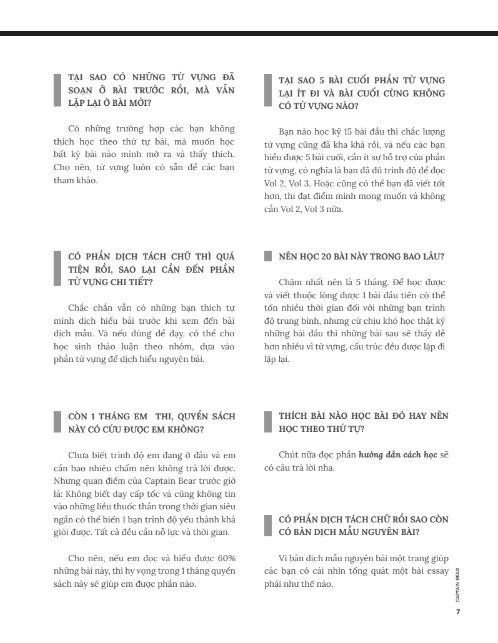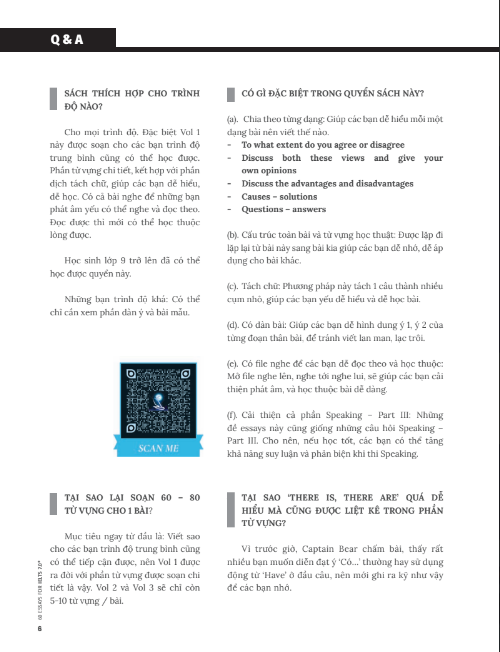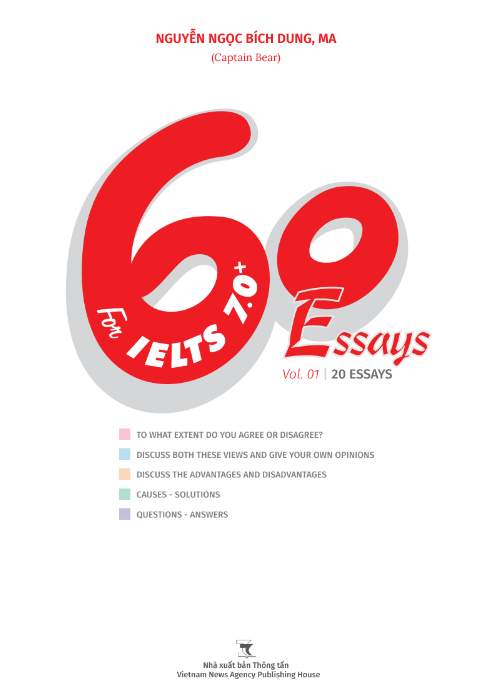


Mục lục
Toggle01 – ĐỀ 1
60 ESSAYS FOR IELTS 7.0+ 16 17
Some people believe that children’s leisure activities must be educational, otherwise they are a complete waste of time.
To what extent do you agree or disagree?
Một số người tin rằng hoạt động giải trí của trẻ phải mang tính giáo dục, nếu không sẽ hoàn toàn là lãng phí thời gian.
Bạn đồng ý hay không đồng ý?
P1 – ĐỘNG NÃO
01
P2 – DÀN Ý
TO WHAT EXTENT DO YOU AGREE OR DISAGREE
60 ESSAYS FOR IELTS 7.0+ 18 19
OUTLINE
INTRODUCTION
When children play, if educational purposes were excluded, it would be totally a waste of time.
_ I do not totally agree.
_ I believe recreational time should be fun and relaxation => educational lessons would follow suit.
BODY 1
30% agree: It would be perfect if educational intention were embedded in children’s activities.
Using instructive toys => instruct, stimulate intellect, emotional, physical development, teach children life skills.
(Examples:
(1) Playing with dolls => taking care of living babies;
(2) Miniature dishes => managing households;
(3) Toy soldiers => enacting a siege.)
BODY 2
70% believe: Whatever children find interesting to play with do educate them – with or without adults’ supervision and initial aims.
Not all parents have
(1) Time to observe children when they play;
(2) Enough money to buy educational toys like LEGO.
=> Poor children play with just a blanket, but still can enhance their imagination, and become good people by acting as supermen to save the world.
CONCLUSION
Intentionally or inadvertently, children would learn something new after playing and it is definitely not a waste of time.
P3 – BÀI MẪU TIẾNG ANH
60 ESSAYS FOR IELTS 7.0+ 18 19
01 – ĐỀ 1
Some people hold the view that when children play, it would be totally a waste of time if educational purposes were excluded. However, I do not completely concur with the idea because I believe the most crucial part of recreational time should be fun and relaxation; then any educational lessons would automatically follow suit.
Có thể bạn cũng muốn đọc thêm các cuốn sách tiếng Anh sau:
To a certain extent, I accept that it would be perfect if an educational intention were explicitly embedded in the activities children do in their free time, especially with toys. In fact, there has been a plethora of instructive ones designed to instruct, stimulate intellect and emotional or physical development or simply teach them a particular life skill. For example, playing with dolls allows children to learn how to take care of living babies or similarly, molded miniature dishes and toy soldiers enable children to mimic adults’ activities like managing a household or enacting a siege.
Notwithstanding, I strongly believe that whatever objects or activities children find interesting to play with do educate them in some respect, even without either adults’ supervision or their initial aims. Intrinsically, not all parents have enough time to observe the whole process of their children’s play time nor can they afford expensive educational toys like LEGO for their children. Actually, when impoverished children play with just a wrinkled dirty blanket, they can still enhance their imagination by acting as supermen who save the world.
In conclusion, it seems to me that there are lessons inside each activity children do in their leisure time. Therefore, intentionally or inadvertently, they would learn something new after playing and this is certainly not a waste of time at all.
(276 words)
Some people believe that children’s leisure activities must be educational, otherwise they are a complete waste of time.
To what extent do you agree or disagree?
P4 – TỪ VỰNG
01 TO WHAT EXTENT DO YOU AGREE OR DISAGREE
60 ESSAYS FOR IELTS 7.0+ 20 21
- hold the view that : có quan điểm là
- even (adv) : thậm chí / ngay cả khi
- totally = completely (adv) : hoàn toàn
- waste of time : tốn/ lãng phí thời gian
- educational ( adj) : có tính giáo dục
- purpose (n) : mục đích
- be excluded (v) : bị loại trừ
- However (conj) : Tuy nhiên = Notwithstanding
- concur with the idea = agree with the idea : đồng ý với quan điểm này
- the most + tính từ : nhất
- crucial (adj) : quan trọng = vital = important
- part (n) : phần
- recreational time : thời gian giải trí
- fun and relaxation : vui vẻ và thoải mái
- automatically (adv) : tự động
- follow suit : theo sau
- To a certain extent : Trong một chừng mực nào đó
- accept (v) : chấp nhận
- perfect (adj) : tuyệt / hoàn hảo
- intention (n) : ý định
- explicitly (adv) : rõ ràng
- be embedded (v) : được lồng ghép
- activity (n) : hoạt động
- free time = leisure time : thời gian rảnh
- especially (adv) : đặc biệt
- toy (n) : đồ chơi
- In fact (conj) : Thật vậy, thật ra
- There is / There are/ There have been / There has been : Có
- a plethora of : một lượng lớn / vô số
- instructive ones : đồ chơi mang tính xây dựng
- instructive ones (which were) designed : đồ chơi mà được thiết kế
- instruct (v) : hướng dẫn
- stimulate intellect : kích thích trí thông minh
- emotional (adj) : (thuộc) cảm xúc
- physical (adj) : (thuộc) thể chất
- development (n) : sự phát triển
- simply (adv) : đơn giản là
- particular (adj) : đặc biệt
- life skill : kĩ năng sống
- For example : ví dụ như
- doll (n) : búp bê
- allow + O + to V1 : cho phép ai làm việc gì đó
- take care of : chăm sóc
- living baby : em bé thật
- similarly (adv) : tương tự
- molded miniature dishes : đồ chơi đồ hàng
- soldier : người lính / quân nhân
- enable + O + to V1 : làm cho có thể
- mimic (v) : bắt chước
- adults’ activities : những hoạt động của người lớn
- like (pre/conj) : như là
- manage a household : quản lý nhà cửa
- enact a siege : thiết lập một đợt bao vây
- strongly believe : rất tin rằng
- whatever (pron) : bất cứ gì
- object (n) : đồ vật / vật thể
- do / does + V1 : nhấn mạnh
- respect (n) : khía cạnh
- without (prep) : mà không / không có
- adults’ supervision : sự giám sát của người lớn
- initial (adj) : ban đầu
- aim (n) : mục đích
- Intrinsically (adv) : Về mặt cơ bản
- enough.. to.. : đủ …. để …
- observe (v) : quan sát
- the whole process : toàn bộ quá trình
- nor + V + S : hoặc …. cũng không …
- afford (v) : có đủ khả năng
- Actually (conj) : thật vậy
- impoverished children : trẻ em nghèo khó
- wrinkled dirty blanket : cái mền dơ dáy nhăn nheo
- enhance their imagination : phát huy trí tưởng tượng
- In conclusion : Kết luận
- it seems to me that : dường như đối với tôi
- Therefore / Thus / Hence : Vì vậy / vậy nên / cho nên
- intentionally (adv) : cố ý
- inadvertently (adv) : vô tình
- certainly (adv) : chắc chắn
P5 – BÀI DỊCH MẪU
Một số người tin rằng hoạt động giải trí của trẻ phải mang tính giáo dục, nếu không sẽ hoàn toàn là lãng phí thời gian.
Bạn đồng ý hay không đồng ý?
Một số người có quan điểm là khi trẻ chơi, sẽ thật là lãng phí thời gian nếu mục đích giáo dục bị loại trừ. Tuy nhiên, tôi không hoàn toàn đồng ý với quan điểm trên vì tôi tin rằng phần quan trọng nhất của thời gian giải trí nên là vui vẻ và thoải mái; rồi những bài học giáo dục sẽ tự động theo sau.
Trong một chừng mực nào đó, tôi thừa nhận là sẽ thật tuyệt nếu ý định giáo dục được lồng ghép rõ ràng vào những hoạt động trẻ chơi trong thời gian rảnh, đặc biệt là thông qua đồ chơi. Thật vậy, đã có vô số những món đồ chơi mang tính hướng dẫn được thiết kế để dẫn dắt, kích thích sự phát triển trí thông minh, thể chất hoặc cảm xúc hoặc đơn giản để dạy trẻ một kỹ năng sống đặc biệt nào đó. Ví dụ như, chơi với búp bê giúp trẻ biết cách chăm sóc em bé hoặc tương tự, đồ chơi đồ hàng và lính đồ chơi giúp trẻ bắt chước những hoạt động của người lớn như quản lý nhà cửa hoặc thiết lập một đợt bao vây.
Tuy nhiên, tôi rất tin là bất kỳ đồ vật hoặc hoạt động nào trẻ thấy thú vị khi chơi đều giáo dục chúng ở một khía cạnh nào đó, thậm chí khi không có sự giám sát của người lớn hoặc không có mục đích giáo dục ban đầu của họ.
Các sách tiếng anh khác cùng chủ đề:
- Tải FREE sách Tổng Hợp Giải Chi Tiết Part 6 TOEIC PDF có tiếng Việt
- Sách Vstep Practice Tests PDF tải FREE có tiếng Việt
- Tải FREE sách Perfect Reading TOEIC 90 RC PDF có tiếng Việt
- Tải FREE sách TOEIC Up Part 4 – Zim Academy PDF
- Sách Vstep Preparation Course Level B1 – B2 – C1 PDF tải FREE có tiếng Việt



